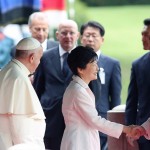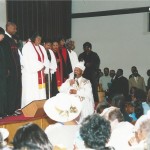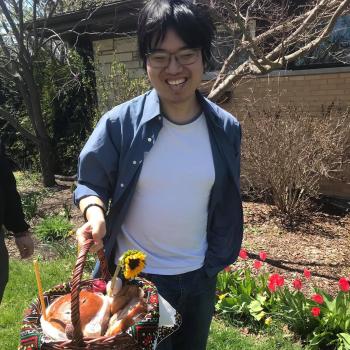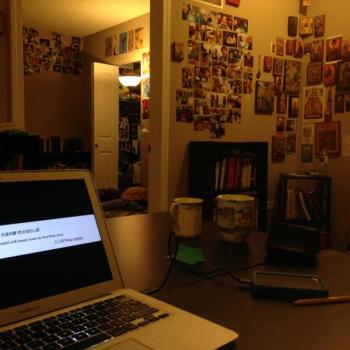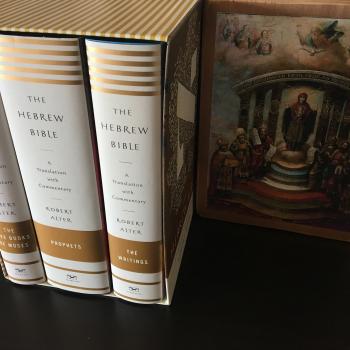![Fresco of the Assumption of Mary at the Basilica de La Macarena in Seville - by José Luiz Bernardes Ribeiro (Fresco_of_the_Assumption_of_Mary_-_Basílica_de_La_Macarena_-_Seville_2.jpg) [CC-BY-SA 3.0 (https://creativecommons.org/licenses/by-sa/3.0/)], via Wikimedia Commons](https://wp-media.patheos.com/blogs/sites/721/2014/08/Fresco_of_the_Assumption_of_Mary_-_Basi%CC%81lica_de_La_Macarena_-_Seville_2-1024x683.jpg)
The news cycle this week has been nuts. From the militarized police action and racialization in Ferguson to evangelical media theologian Vicky Beeching coming out as gay, from the mixed-up reports about the Islamic State to the unresolved crisis in Gaza, these ‘wars and rumors of wars’ have rung with apocalyptic tones.
The problem with even having a conversation about these things is that they are layered with assumptions.
My friend Sam Rocha over at Patheos Catholic has experienced this layering in quite a visceral way this week. After posting a rebuttal to conservative Catholics who accuse the Muslim ummah of not speaking out about the Islamic State, Rocha found himself in the midst of a maelstrom of misunderstanding. He had ended his post with a call to Patheos’s Muslim channel to cover the Islamic State news more, precisely as a way to disengage the channel from the atrocities in Iraq and beyond:
My question to my Abrahamic brothers and sisters at the Patheos Muslim channel is, why are you not reporting on — and joining — the predominant voices of your religious community (and your channel editor)?
Rocha found himself quickly rearticulated by some on his channel who saw this as their opportunity to insinuate that the Muslim channel had insidious ulterior motives for their silence. Thankfully, there were those on the Muslim channel who responded graciously and informatively. But in all of these testy exchanges, Rocha’s conciliatory attempt to invite both the Catholic and Muslim channels to a conversation were rearticulated through the assumption that a question like the one Rocha posed needs to be interpreted through the lens of a holy war that had to be de-escalated. This is far from the case, of course — Rocha calls the Muslim channel his ‘Abrahamic brothers and sisters’ and promises to practice more fully what Pope Francis calls a ‘culture of encounter.’ But it was difficult to be heard. That was because Rocha was speaking into fora layered with assumptions.
Or take the example of Vicky Beeching coming out. The Independent‘s report on the matter confirms that the trusted sources who knew about her sexuality were Katherine Welby, her father Justin Cantuar, and her parents, some of whom have different theological understandings of the sexuality debates than her strong, earlier-acknowledged stance on LGBT theology. In an interview with Channel 4 News, though, Beeching’s story was paired with longtime anti-gay activist Scott Lively, who dragged her over the coals for living a ‘lie’ that denied the ‘biblical’ teaching on sexuality in Genesis. When Beeching clarified that there were multiple possible readings of the biblical text — a point that even St. Augustine acknowledges in De Doctrina Christiana — Lively spoke over her to charge that she was not giving him the chance to speak and express his ‘biblical’ view. But therein lay the dilemma. He had been speaking, expressing, articulating, and when Beeching asked to deconstruct some of his assumptions about being ‘biblical’ — especially because she had studied the Bible and tradition at a graduate level — he wouldn’t hear it. His assumptions led to a train of accusations that here was a major Christian leader who had now fallen.
Or take the convoluted stories we are now hearing about both Ferguson and Gaza, which are apparently linked because the militarization of the police in Ferguson took direct cues from the Israeli Defence Forces. What is even more confusing now, though, is that for all of the talk of Ferguson appearing like a war zone, the death of Michael Brown was passed off today as a botched attempt to arrest him for a convenience store strong-arm robbery, only now to have to backtrack on that when the public learned that the robbery was not connected to the actual reason Brown was stopped, which is apparently now jaywalking. These twists and turns also reflect the confusion around the Gaza story — who kidnapped whom? who shot first? how many civilians are dying? who’s really committing atrocities? The result is that the public is left to our own assumptions about what is actually happening, which means that what is really being allowed to control these stories is not what is actually happening — it’s one’s own knowledge of good and evil on race, militarization, Israel/Palestine, and the police state.
All of this arrives at the doorstep of the church catholic today on the Feast of the Assumption of Mary. I’m sure that jokes could be made about this Protestant author talking about how Catholics assume that Mary was assumed into heaven.
But to simply stop at that corny punchline would be to miss the point.
The Assumption matters, even for Protestants. If indeed Mary has been assumed ahead of the pilgrim church into her full risen life, then the apparitions that she has made — and that Protestants doubt actually happened — take on much more powerful significance, for it would mean that the Blessed Virgin is living out her risen life by preaching to a world wracked by the conflict around its ideological assumptions — its continual eating in the fruit of the knowledge of good and evil, as Lutheran theologian Dietrich Bonhoeffer
would say — instead of dealing with the concrete historical and ethnographic realities before us.
In this sense, Mary remains a political figure in modernity. From race relations at Guadalupe to her protest against secularization at Lourdes to her interpretation of twentieth-century geopolitcs at Fatima — among her other apparitions — Mary says to us that when we allow ideological fictions to rewrite history and rearticulate reality, we are not encountering each other as human persons. We may encounter each other as racial projects, states of exception, theological heretics, and agents of the police state, but to do that is to reduce the human person to a set of disembodied ideas. No, Mary says. I am here. I have physically appeared to you. I am the Lady who is speaking to you. She will not let us exist as ideas. Her Assumption forces us to encounter each other as bodily persons. This is what the Archbishop of Canterbury, Justin Welby, means when he calls on us to a graciousness in ‘deep disagreement’ where one assumes the best about one’s ideological opponents, precisely what he has shown toward Vicky Beeching in her journey. As a practitioner of Catholic social teaching, Welby knows that he is channeling Paul VI’s ‘civilization of love‘ from his 1970 Regina Coeli speech. And thus he would have no problem with me, a Chinglican, saying that the Assumption of Mary is the krisis of our assumptions.
Hail, star of the sea,
Nurturing Mother of God,
And ever Virgin
Happy gate of heaven.
Receiving that ‘Ave’
From the mouth of Gabriel
Establish us in peace,
Transforming the name of ‘Eve.’
Loosen the chains of the guilty,
Send forth light to the blind
Our evil do thou dispel,
Entreat for us all good things.
Show thyself to be a Mother:
Through thee may he receive prayer
Who, being born for us,
Undertook to be thine own.
O unique Virgin,
Meek above all others,
Make us, set free from our sins
Meek and chaste.
Bestow a pure life,
Prepare a safe way:
That seeing Jesus,
We may ever rejoice.
Praise be to God the Father,
To the Most High Christ be glory
To the Holy Spirit
Be honour, to the Three equally. Amen.

